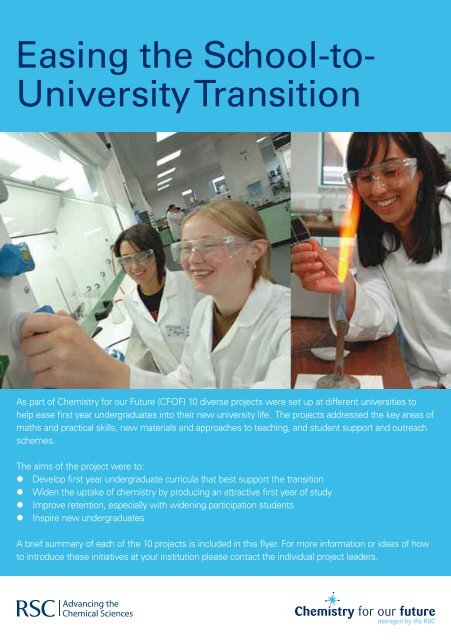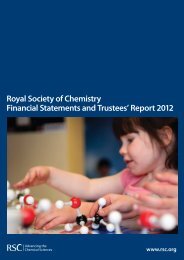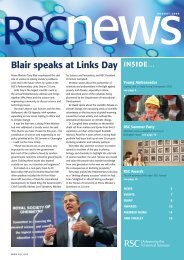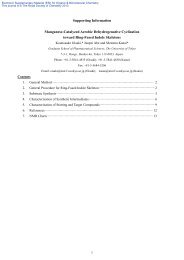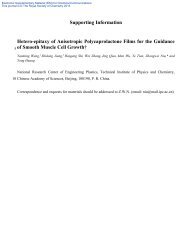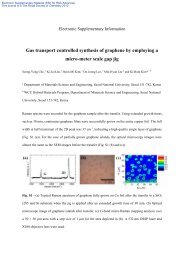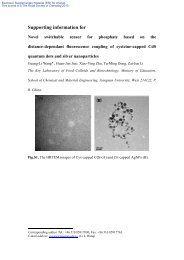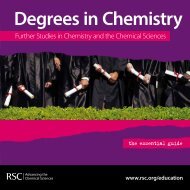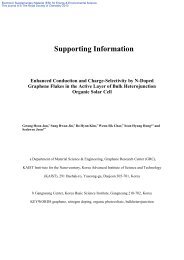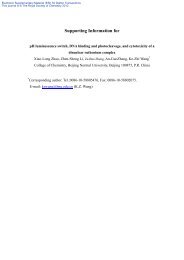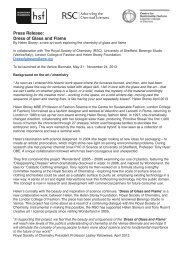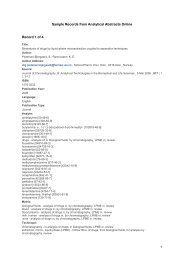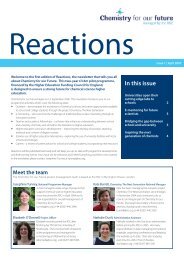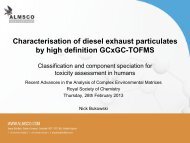Easing the School-to- University Transition - Royal Society of ...
Easing the School-to- University Transition - Royal Society of ...
Easing the School-to- University Transition - Royal Society of ...
Create successful ePaper yourself
Turn your PDF publications into a flip-book with our unique Google optimized e-Paper software.
<strong>Easing</strong> <strong>the</strong> <strong>School</strong>-<strong>to</strong>-<br />
<strong>University</strong> <strong>Transition</strong><br />
As part <strong>of</strong> Chemistry for our Future (CFOF) 10 diverse projects were set up at different universities <strong>to</strong><br />
help ease first year undergraduates in<strong>to</strong> <strong>the</strong>ir new university life. The projects addressed <strong>the</strong> key areas <strong>of</strong><br />
maths and practical skills, new materials and approaches <strong>to</strong> teaching, and student support and outreach<br />
schemes.<br />
The aims <strong>of</strong> <strong>the</strong> project were <strong>to</strong>:<br />
• Develop first year undergraduate curricula that best support <strong>the</strong> transition<br />
• Widen <strong>the</strong> uptake <strong>of</strong> chemistry by producing an attractive first year <strong>of</strong> study<br />
• Improve retention, especially with widening participation students<br />
• Inspire new undergraduates<br />
A brief summary <strong>of</strong> each <strong>of</strong> <strong>the</strong> 10 projects is included in this flyer. For more information or ideas <strong>of</strong> how<br />
<strong>to</strong> introduce <strong>the</strong>se initiatives at your institution please contact <strong>the</strong> individual project leaders.
Maths and practical skills<br />
Quantitative chemistry - a blended-learning resource<br />
<strong>University</strong> Project Summary Successes<br />
Bath<br />
Development <strong>of</strong> interactive web<br />
resources for teaching maths in <strong>the</strong><br />
context <strong>of</strong> chemistry.<br />
Contact – Dr Gareth Price (G.J.Price@bath.ac.uk)<br />
Maths provision for new chemistry undergraduates<br />
<strong>University</strong> Project Summary Successes<br />
Bris<strong>to</strong>l<br />
Review <strong>of</strong> how maths is taught <strong>to</strong><br />
chemistry undergraduates at 30 HEI<br />
departments and development <strong>of</strong> weeklong<br />
maths workshop aimed at students<br />
without A-level Maths.<br />
Contact – Pr<strong>of</strong>essor Dudley Shallcross (d.e.shallcross@bris.ac.uk)<br />
Chemical boot-camps<br />
<strong>University</strong> Project Summary Successes<br />
Manchester<br />
A week-long intensive course in practical<br />
techniques in organic, inorganic, physical<br />
and analytical chemistry, run <strong>the</strong> summer<br />
before students start <strong>the</strong>ir chemistry<br />
degree.<br />
Contact – Dr Sarah Heath (sarah.l.heath@manchester.ac.uk)<br />
New materials and approaches <strong>to</strong> teaching<br />
Untangling <strong>the</strong> concept chain<br />
<strong>University</strong> Project Summary Successes<br />
Loughborough<br />
Reviewing <strong>the</strong> first year teaching model<br />
- introducing ideas and concepts in a<br />
logical order <strong>to</strong> mesh with students’<br />
previous experience at A-level.<br />
Contact - Pr<strong>of</strong>essor Ray C F Jones (r.c.f.jones@lboro.ac.uk)<br />
Video guidance for transitional chemistry<br />
<strong>University</strong> Project Summary Successes<br />
UWE<br />
Addresses <strong>the</strong> pre-arrival knowledge<br />
gap in chemistry using short, online<br />
video clips focused on bite-sized learning<br />
objectives. Training developed in local<br />
production <strong>of</strong> videos using screencapture<br />
s<strong>of</strong>tware (Camtasia).<br />
Contact – Dr Dilys Thorn<strong>to</strong>n (dilys.thorn<strong>to</strong>n@uwe.ac.uk )<br />
VLE maths resources available at www.<br />
symplekta.co.uk and <strong>the</strong> project has<br />
advised <strong>the</strong> Pfizer funded initiative<br />
Discover Maths hosted at <strong>the</strong> <strong>Royal</strong><br />
<strong>Society</strong> <strong>of</strong> Chemistry (RSC).<br />
Project has advised Discover Maths.<br />
Massive improvement in algebra and<br />
calculus skills during summer school for<br />
pupils; around 7% improvement in Yr 1<br />
physical chemistry marks.<br />
The course has significantly boosted <strong>the</strong><br />
confidence <strong>of</strong> Yr 1 undergraduates in <strong>the</strong><br />
labs: ‘I feel very strongly that this week<br />
will make <strong>the</strong> transition between sixth<br />
form and university a lot smoo<strong>the</strong>r and<br />
much less daunting.’<br />
Concept map produced, based on student<br />
feedback, <strong>to</strong> determine how much overlap<br />
<strong>the</strong>re is in organic and physical chemistry<br />
at A-level and Yr 1. An introduc<strong>to</strong>ry<br />
‘structure and reactivity’ module has also<br />
been developed.<br />
Over 40 organic videos reviewing<br />
A-level chemistry are available at www.<br />
science.uwe.ac.uk/ls/orgchem/. Videos on<br />
essential maths for science and statistics<br />
available at www.science.uwe.ac.uk/<br />
MathsStats/video_link/video.htm.
Student support and outreach<br />
Developing inspirational activities for new undergraduate students<br />
<strong>University</strong> Project Summary Successes<br />
Hull<br />
Two competition/game events for<br />
first year undergraduates designed<br />
<strong>to</strong> improve team-working skills, build<br />
confidence and willingness <strong>to</strong> participate.<br />
Contact – Dr Phillip King (p.j.king@hull.ac.uk)<br />
New methods for student men<strong>to</strong>ring<br />
<strong>University</strong> Project Summary Successes<br />
Reading<br />
Supporting new students through<br />
directed self-study, a parenting scheme<br />
and non-traditional course delivery using<br />
Personal Response Systems (PRS).<br />
Contact – Dr Elizabeth Page (e.m.page@reading.ac.uk)<br />
Chemistry - from registration <strong>to</strong> graduation<br />
<strong>University</strong> Project Summary Successes<br />
Southamp<strong>to</strong>n<br />
New online resources and teaching<br />
methods which bridge <strong>the</strong> knowledge<br />
gap between A-level and Yr 1<br />
undergraduate chemistry.<br />
Contact – Dr David Read (D.Read@so<strong>to</strong>n.ac.uk)<br />
Science for <strong>the</strong> 21st Century initiative<br />
<strong>University</strong> Project Summary Successes<br />
Warwick<br />
Promoting contemporary science <strong>to</strong><br />
pre-university students via experimental<br />
research, publication <strong>of</strong> a science review<br />
journal and a national biennial conference.<br />
The scheme forges links between state<br />
and independent schools in <strong>the</strong> area.<br />
Contact – Pr<strong>of</strong>essor Tim Bugg (T.D.Bugg@warwick.ac.uk )<br />
Chemist-2-Chemist<br />
<strong>University</strong> Project Summary Successes<br />
York<br />
Developing a support network that will<br />
coordinate academic, pas<strong>to</strong>ral and social<br />
aspects <strong>of</strong> first year undergraduate<br />
chemistry as well as a schools outreach<br />
programme which involves Yr 1<br />
undergraduates visiting <strong>the</strong>ir old schools.<br />
Contact – Dr Nigel Lowe (nl6@york.ac.uk )<br />
90% attendance <strong>of</strong> event in <strong>the</strong><br />
first semester. Activities encourage<br />
entrepreneurship such as forming a<br />
company and patenting and marketing<br />
a product. As part <strong>of</strong> a range <strong>of</strong> Yr 1<br />
activities, <strong>the</strong> project has improved<br />
retention and greater student<br />
satisfaction.<br />
Production <strong>of</strong> online self-study materials;<br />
73% <strong>of</strong> Yr 1 undergraduates stated<br />
<strong>the</strong>y felt more confident carrying out<br />
experimental techniques having completed<br />
<strong>the</strong> introduc<strong>to</strong>ry practical course.<br />
Resources including virtual <strong>to</strong>urs, A-level<br />
revision resources and use <strong>of</strong> PRS. A prelab<br />
course has been developed (including<br />
videos), and interactive online resources<br />
<strong>to</strong> help students respond <strong>to</strong> feedback.<br />
Formed clusters <strong>of</strong> schools within <strong>the</strong><br />
area each developing strong links with<br />
<strong>the</strong> <strong>University</strong>. Outputs can be seen<br />
at http://www2.warwick.ac.uk/fac/sci/<br />
chemistry/<br />
Interaction between current chemistry<br />
undergraduates with incoming<br />
undergraduates - support mechanisms<br />
include student men<strong>to</strong>ring and revision<br />
workshops. Organised over 30 school<br />
visits, reaching 400 Yr 11-13 students<br />
through <strong>the</strong> outreach programme.
Project examples<br />
Video guidance for transitional chemistry – <strong>University</strong> <strong>of</strong> <strong>the</strong> West <strong>of</strong> England<br />
A set <strong>of</strong> basic and organic chemistry flash videos have been produced by UWE and are available<br />
free online. The videos have had excellent feedback from both students and o<strong>the</strong>r academic staff:<br />
- ‘clear and easy <strong>to</strong> understand’<br />
- ‘good because you can pause and go over<br />
material as many times as needed’<br />
- ‘a revision aid <strong>to</strong> enhance material covered in<br />
lectures’<br />
A training workshop for academic staff demonstrated<br />
that <strong>the</strong>se videos are also easy <strong>to</strong> produce, with<br />
o<strong>the</strong>r lecturers now using <strong>the</strong> same technology <strong>to</strong><br />
develop <strong>the</strong>ir own learning resources.<br />
Interactive online lecture courses available at www.science.uwe.ac.uk/ls/orgchem/<br />
Science for <strong>the</strong> 21st Century - <strong>University</strong> <strong>of</strong><br />
Warwick<br />
“It is refreshing <strong>to</strong> see so many youngsters<br />
communicating modern science with high<br />
levels <strong>of</strong> enthusiasm and pr<strong>of</strong>iciency.”<br />
Pr<strong>of</strong> Sir David King FRS, HMG Chief<br />
Scientist - referring <strong>to</strong> <strong>the</strong> work conducted<br />
by <strong>the</strong> <strong>University</strong> <strong>of</strong> Warwick<br />
Chemistry: from registration <strong>to</strong> graduation<br />
– <strong>University</strong> <strong>of</strong> Southamp<strong>to</strong>n<br />
“The highlight for us at Southamp<strong>to</strong>n has<br />
been <strong>the</strong> engagement <strong>of</strong> students with <strong>the</strong><br />
developments we have been working on,<br />
and our project has facilitated <strong>the</strong> two-way<br />
communication between staff and students.<br />
Our introduction <strong>of</strong> zappers (PRS) and prelabs<br />
has been met with almost universal<br />
acclaim from students, and <strong>the</strong>y have been<br />
forthcoming with constructive suggestions<br />
for improvements which will benefit future<br />
cohorts. Perhaps <strong>the</strong> clearest indication <strong>of</strong> <strong>the</strong><br />
success <strong>of</strong> our project is found in our retention<br />
figures, with a remarkably low dropout rate<br />
<strong>of</strong>


